Related Research Articles
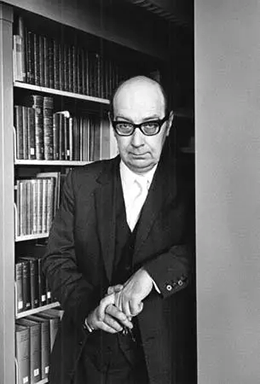
Philip Arthur Larkin was an English poet, novelist, and librarian. His first book of poetry, The North Ship, was published in 1945, followed by two novels, Jill (1946) and A Girl in Winter (1947). He came to prominence in 1955 with the publication of his second collection of poems, The Less Deceived, followed by The Whitsun Weddings (1964) and High Windows (1974). He contributed to The Daily Telegraph as its jazz critic from 1961 to 1971, with his articles gathered in All What Jazz: A Record Diary 1961–71 (1985), and edited The Oxford Book of Twentieth Century English Verse (1973). His many honours include the Queen's Gold Medal for Poetry. He was offered, but declined, the position of Poet Laureate in 1984, following the death of Sir John Betjeman.
Elizabeth Joan Jennings was a British poet.
The Movement was a term coined in 1954 by J. D. Scott, literary editor of The Spectator, to describe a group of writers including Philip Larkin, Kingsley Amis, Donald Davie, D. J. Enright, John Wain, Elizabeth Jennings, Thom Gunn and Robert Conquest. The Movement was quintessentially English in character; poets from other parts of the United Kingdom were not involved.
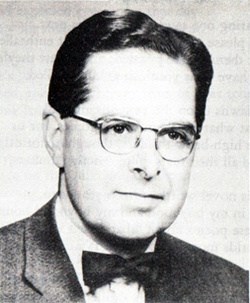
Donald Alfred Davie, FBA was an English Movement poet, and literary critic. His poems in general are philosophical and abstract, but often evoke various landscapes.
Ruth Pitter, CBE, FRSL was a British poet.
John Barrington Wain CBE was an English poet, novelist, and critic, associated with the literary group known as "The Movement". He worked for most of his life as a freelance journalist and author, writing and reviewing for newspapers and the radio.
Thomson William "Thom" Gunn was an English poet who was praised for his early verses in England, where he was associated with The Movement, and his later poetry in America, where he adopted a looser, free-verse style. Gunn wrote about his experience moving to San Francisco from England. He received numerous literary honors, and his best poems are reputed to possess a restrained elegance of philosophy.
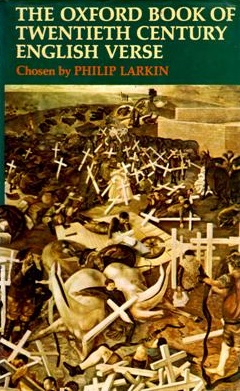
The Oxford Book of Twentieth Century English Verse is a poetry anthology edited by Philip Larkin. It was published in 1973 by Oxford University Press with ISBN 0-19-812137-7. Larkin writes in the short preface that the selection is wide rather than deep; and also notes that for the post-1914 period it is more a collection of poems, than of poets. The remit was limited by him to poets with a period of residence in the British Isles. Larkin's generous selection of Thomas Hardy's poems has been noted for its influence on Hardy's later reputation. On the other hand, he was criticized, notably by Donald Davie, for his inclusion of "pop" poets such as Brian Patten. The volume contains works by 207 poets.
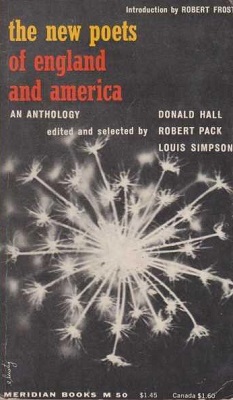
New Poets of England and America was a poetry anthology edited by Donald Hall, Robert Pack and Louis Simpson, and published in 1957. In the post-war story about relations between American and British poetry, it represents the moment of closest rapprochement, actual or intended. The introduction was written by Robert Frost. The inclusion of a number of British Movement poets, as well as others, implies some kind of search for matching figures amongst the Americans. Poets had to be under forty years old to be included.
The Faber Book of Modern Verse was a poetry anthology, edited in its first edition by Michael Roberts, and published in 1936 by Faber and Faber. There was a second edition (1951) edited by Anne Ridler, and a third edition (1965) edited by Donald Hall. The selection was of poems in English printed after 1910, which meant that work by Gerard Manley Hopkins could be included. A later edition was edited by Peter Porter.
British Poetry since 1945 is a poetry anthology edited by Edward Lucie-Smith, published in 1970 by Penguin Books, with a second and last edition in 1985. The anthology is a careful attempt to take account of the whole span of post-war British poetry, including poets from The Group, a London-centred workshop that Lucie-Smith himself had once been chairman of, following the departure of founder Philip Hobsbaum.
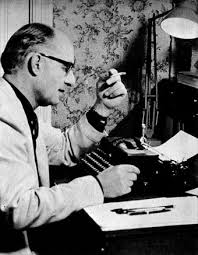
Henry Treece was a British poet and writer who also worked as a teacher and editor. He wrote a range of works but is mostly remembered as a writer of children's historical novels.

George Sutherland Fraser was a Scottish poet, literary critic and academic.
The Penguin poetry anthologies, published by Penguin Books, have at times played the role of a "third force" in British poetry, less literary than those from Faber and Faber, and less academic than those from Oxford University Press..
Anthony Simon Thwaite OBE was an English poet and critic, widely known as the editor of his friend Philip Larkin's collected poems and letters.
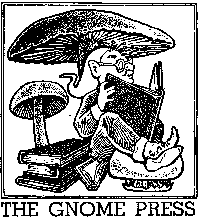
Gnome Press was an American small-press publishing company active 1948 – 1962 and primarily known for fantasy and science fiction, many later regarded as classics.
Nationality words link to articles with information on the nation's poetry or literature.
Nationality words link to articles with information on the nation's poetry or literature.
The Shelley Memorial Award of the Poetry Society of America, was established by the will of Mary P. Sears, and named after the poet Percy Bysshe Shelley. The prize is given to a living American poet selected with reference to genius and need, and is currently worth (2014) between $6,000 and $9,000. The selection is made by a jury of three poets: one each appointed by the presidents of Radcliffe and Berkeley, and the third by the Board of Governors of the Society.
Nationality words link to articles with information on the nation's poetry or literature.
References
- ↑ You Muddy Fools Letter by Trevor Denning to the London Review of Books, 7 February 2002
- ↑ James Keery, "Menacing Works in my Isolation" in The Thing About Roy Fisher, Liverpool University, 2000, p.53
- ↑ Obituary: Elizabeth Jennings Grevel Lindop, The Guardian, Wednesday October 31, 2001
- ↑ Thom Gunn (1929 - 2004), The Poetry Foundation
- ↑ Biography - Philip Larkin (1922-85) Archived 2010-02-09 at the Wayback Machine The Philip Larkin Society
- ↑ "Fantasy Press", Peter Harrington
- ↑ Biblio
- ↑ "George MacBeth 1932-92", Old Edwardians
- ↑ Biblio
- ↑ Richard Warren, "Back from oblivion: tracking the poetry of Gordon Wharton"
- ↑ Biblio
- ↑ Abe Books
- ↑ Clearwater Books
- ↑ Poetry Archive
- ↑ World Cat
- ↑ Valentine Cunningham, "Literary Culture", in The History of the University of Oxford, OUP 1994, vol. VIII (The Twentieth Century), p.424
- ↑ William Wootten, The Alvarez Generation, Liverpool University Press, 2015, p.3ff
- ↑ Abe Books
- ↑ John Cotton, The Fantasy Press (Dodman Press, 1977) Google Books
- ↑ A. T. Tolley, "Lotte Zurndorfer: A Forgotten Poet", PN Review 213 (2013)
- ↑ Oliver Tearle, "The Forgotten Movement Poet: The Poetry of Jonathan Price" (1931-85), Interesting Literature
- ↑ Selig, Richard, 1929-1957, snac
- ↑ "HOLLOWAY, Mark 1917-2004, Encyclopedia.com
- ↑ "Aldridge, Richard (1930 - 1994)", Maine State Library
- ↑ "KEENE, Dennis 1934–", Encyclopedia.com